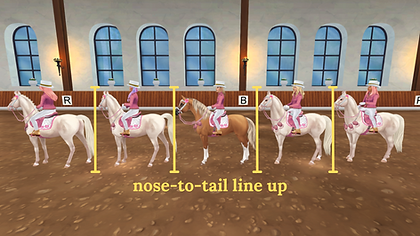
Kapitola 1
Line Orders
1.

Odds & Evens
Odd & Even
Odds and evens refers to the order given to the riders. Each rider is given an odd or even title depending on their position within the rider line. The rider's odd and even line order will inform them of which direction they do certain moves, which go is theirs, and more.

LINE LEADER
ODD
SECOND RIDER
EVEN
THIRD RIDER
ODD
FOURTH RIDER
EVEN
When counting odd and even, count in pairs of two. Starting with the line leader as odd, second in line even, third in line odd, fourth in line even, and continue!
Flipper

This card can be used as a odd and even flipper during dressage performances! Riders may have the card flipper at their computer, and when given a line order the rider may flip the card to whichever order they are given! Allowing the rider to easily keep track of their line order and directions!
Flipper
-
Download the flipper and print out the flipper card
-
Cut out the card
-
Fold the card in half, then tape or glue the two sides together

2.

Line Orders
Rider Line Terms
There are a variety of terms that define line orders and different positions within the rider line. Rider line refers to the riders within the line-up.

Original Line Order
Original line order or original rider line refers to the first ordering of riders during the initial line-up.
Reverse Line Order
Reverse line order refers to the rider line reversing in order, the rider who was originally last in line is now the line leader.
Original Line Lead
Original line leader refers to the first position in the rider line. The rider who is leading the line is the original line leader.
Secondary Line Lead
Secondary line leader refers to the second position in the rider line. The rider who is second in line is the secondary line leader.
Reverse Line Lead
Reverse line leader refers to the last rider in line. When the rider line reverses order, this rider becomes the new line leader.
Line-Up
During line-up, the riders will line-up using Nose-To-Tail (NTT) gaps. The riders will place their horse's nose behind the rider's tail in front of them (not inside or overtop). During line-up, the riders will make sure they are evenly spaced and straight on the sand line.
Using NTT during line-up creates evenly spaced rider lines that are not uneven nor are the riders standing inside of each other.

Line Orders
There are 3 main line orders used to number the riders for various moves and formations.
1. Original
2. Split
3. Secondary
If needed, additional line orders can be created.
Original Line Order
Original line order refers to the initial odd/even line order given to the riders during line-up.

Split Line Order
Split line order refers to the original rider line splitting, resulting in two rider lines with one being all odds and one being all evens.
Even though the riders split, they do not change their odd and even number. When the rider line splits, odds go left and evens go right; resulting in odds in one line and evens in another.

Secondary Line Order
Secondary line order refers to the rider line taking on a second odd and even numbering. This line order can be used for routines that require different riders to perform various moves.
Secondary line orders can be given or called when the rider line has split or when the rider line is still in its original line.
Secondary Line Order from Original Line Order
When counting secondary line order while the riders are in original line order, count odds and evens in pairs of two:
odd - odd - even - even - odd - odd - even - even
-
The original line leader remains an odd
-
The original 2nd rider is now an odd
-
The original 3rd rider is now an even
-
The original 4th rider remains an even
-
The original 5th rider remains an odd
-
The original 6th rider is now an odd

Secondary Line Order from Original Split Order
When counting secondary line order in a split rider line, count from each line leader in an odd and even ordering, starting with both of the leaders as an odd.
-
The 1st rider in line is an odd
-
The 2nd rider in line is an even
-
The 3rd rider in line is an odd
-
The 4th rider in line is an even
-
and continue

If you ever forget your original line order, you can count by starting with your line leader being an odd. Count down the rider line odd - even - odd - even. Or, you can use the odd and even flipper card.



